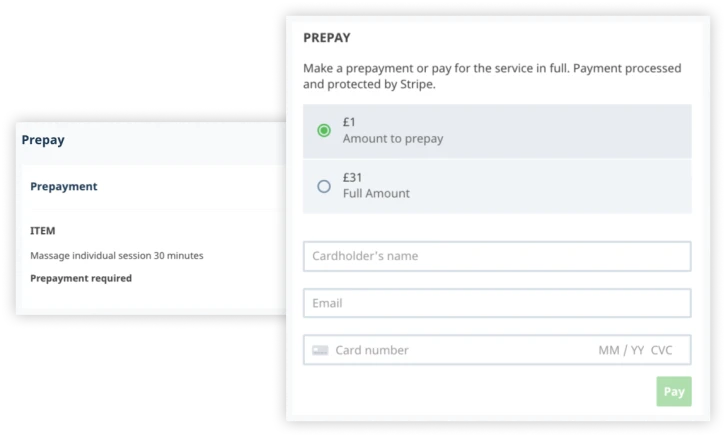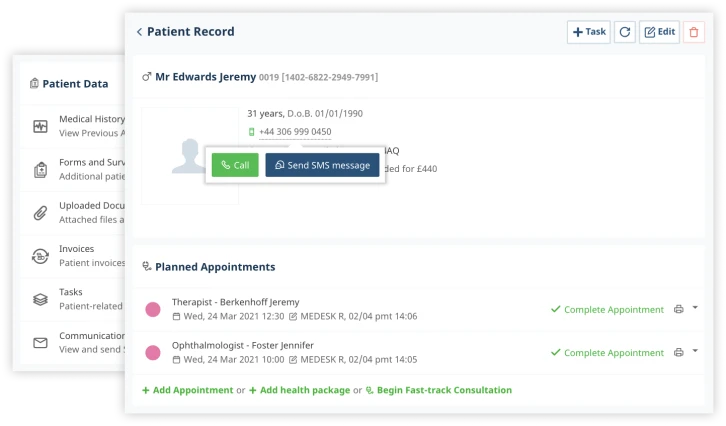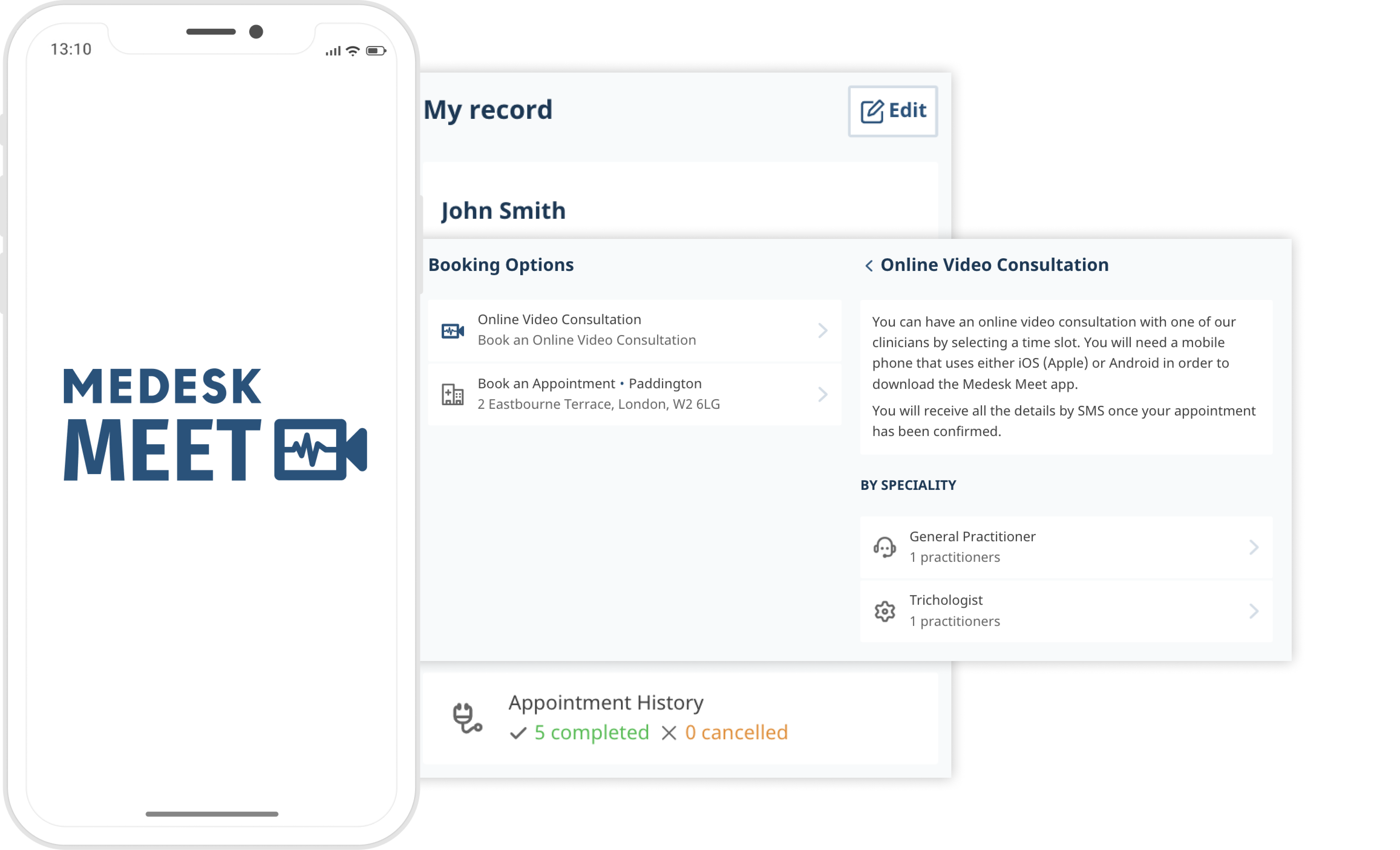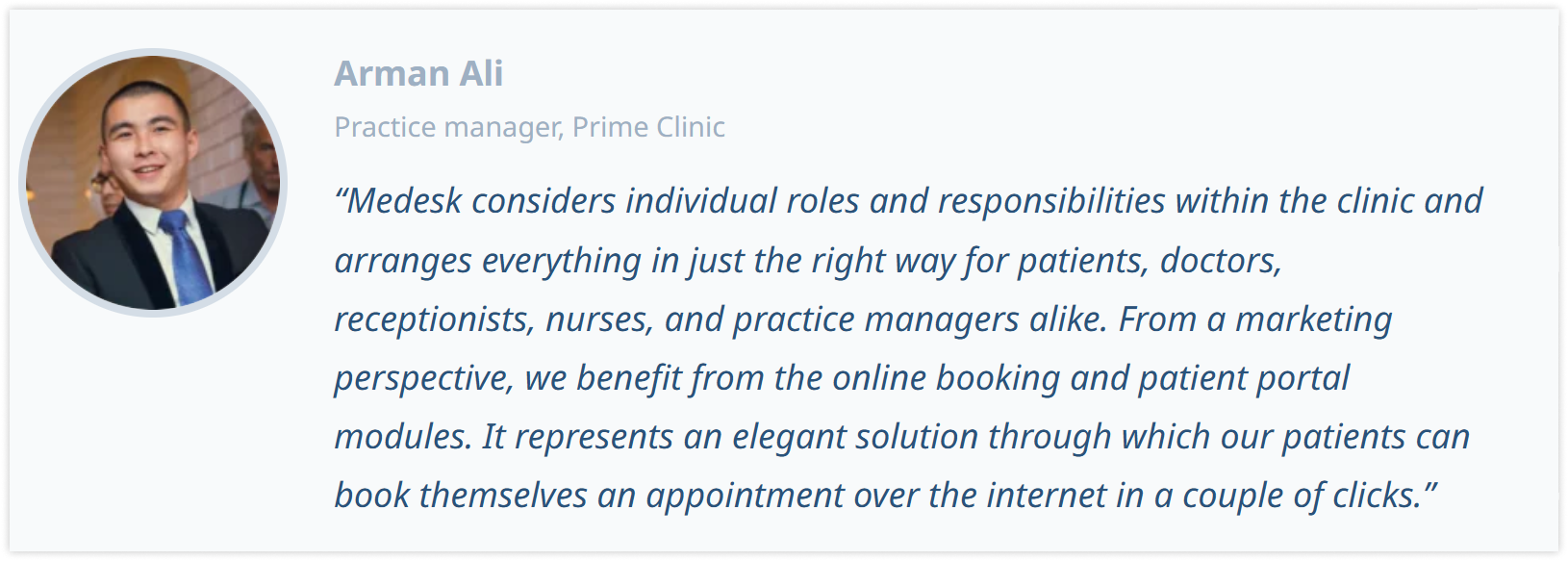If you are new to owning a private medical practice, you might find yourself struggling with private practice management at first.
After all, running a private practice takes more than medical knowledge. It involves business, accounting, and general management skills that aren’t taught in med school.
But don’t worry, this doesn’t mean you can’t run your own clinic if you don’t have an MBA! We have put together a complete guide to private practice management to help you make your medical practice succeed.
Let’s dive right in!
Learn how to simplify your practice workflow and free up more time for patients with Medesk.
Open the detailed description >>What is Private Practice Management?
Private practice management is the combination of all of the administrative processes that keep a private practice running smoothly.
Some of those tasks include:
- Hiring staff
- Supervising staff and facilities
- Developing a referral base
- Budgeting
- Billing
- Staying up to date with the best medical services.
Moreover, medical practice management can be applied in a variety of practices, such as private GP services, clinics, private hospitals, nursing homes, etc. Although running a clinic is different from running a private healthcare practice, the basic rules apply to all. Let's talk about them in more detail.
9 Tips to Better Manage Your Private Practice
By now, we've just scratched the surface of private practice management. Our tips will give you the in-depth explanation you need to succeed in all aspects of private GP clinic management.
#1. Keep in Mind That Your Healthcare Practice is a Business
At the end of the day, a healthcare service is a business like any other. So, while providing quality medical care is extremely important, you shouldn't neglect other important duties such as administration and medical practice accounting.
To do this, make sure you put enough time into developing skills such as:
- Bookkeeping, to keep track of all financial transactions.
- Marketing, to ensure the growth of your medical practice.
- Managing human resources to acquire and maintain highly qualified and competent staff, potentially by partnering with physician executive search firms specializing in healthcare recruitment.
- Facility management, to ensure your practice remains a safe, compliant, and well-maintained environment for both staff and patients.
So how exactly do you go about improving these skills?
Though it is not necessary to have a business degree in order to run a private practice, it’s a good idea to invest time and money into taking some business management courses.
#2. Get Professional Advice
Running a private medical practice can be complicated and requires a wide range of expertise.
That’s why, in addition to developing new skills, it is also important to seek help from professionals such as attorneys or accountants in areas that you might not be fully competent in. For example, you might need a little help dealing with issues such as healthcare employee liability or financial auditing.
So take the time to assess which workflows of your private practice require additional expertise and make sure you consult with professionals who can provide you expert advice.
Medesk helps automate scheduling and record-keeping, allowing you to recreate an individual approach to each patient, providing them with maximum attention.
Learn more >>#3. Learn How to Save Time
Efficient time management plays a big part in the success of any business.
Unfortunately, many of the tasks involved in running a clinic are very time-consuming. For example, doctors waste over two-thirds of their time doing paperwork, even though that time could be better spent focusing on patients or growing the practice.
So, keep track of which activities are the most time-consuming and think of ways to cut back. Instead of doing all of your accounting by hand, invest in a financial tool that can automate the process for you. Especially when you can try it for free right here, right now!

#4. Take Care of Your Staff
Your clinic can only be as good as the clinicians it employs. So it goes without saying that you need qualified and well-trained healthcare professionals on your team.
To do this, however, simply hiring the best won’t suffice. To keep your employee turnover low, make sure you provide support when they need it, give them motivation and encouragement to grow as professionals, and build a positive practice work environment where they can thrive.
Implementing a time and attendance tracking software can also help reduce burnout, ensuring fair work hours and preventing staff from being overburdened.
#5. Invest in Ongoing Learning and Enrichment
Healthcare workers are more likely to feel unfulfilled, make mistakes, and get mental health issues when they are not properly trained. This can be felt especially with more and more general practices turning to digital solutions to manage their daily tasks.
It takes time to become competent in medical software, so make sure you provide regular, ongoing training to your employees.
#6. Ditch Paper-Based Records
Over 83% of doctors in the US are already using electronic health records (EHR). And in 2025, it’s time that you do too! EHR offers many benefits for private practices that paper-based records just can’t compete with.

These benefits include:
- Saving time and space by storing all records digitally and reducing menial form-filling work for your staff.
- Lowering operational costs by reducing the workload of receptionists.
- Providing decision-making support through information management tools that offer evidence-based guidance to help determine the best treatment options and assist with patients’ diagnoses.
- Allowing easy sharing, as EHRs can follow the patient wherever they go (e.g., to another practice, specialist, hospital, or nursing home).
- Providing a more detailed picture of a patient’s health by collecting and compiling information from all private doctors, laboratories, or specialists involved in the patient’s care.
- Allowing e-prescribing so your physicians can issue prescriptions remotely, without the patient having to visit the clinic.
Discover more about the essential features of Medesk and claim your free access today!
Explore now >>#7. Don’t Let Distance Keep You From Your Patients
Patients might not be able to come into the clinic in person for a variety of reasons. They might have limited mobility, live far, or be in quarantine.
But with the advancements in medical software, there is no reason for you to lose these patients to competitors. No matter if the patient can’t come in or their doctor is out of town, telemedicine allows both parties to attend an appointment from anywhere in the world. Thanks to an online appointment booking system with easy access, your patient can book an appointment even from his smartphone. It frees up time for both sides of the treatment process.

#8. Tighten Your Security
A security breach in data protection can seriously damage the reputation of your healthcare practice and could potentially cost you millions. Not only are your patients not likely to continue using your clinic or recommend it to anyone else after such a breach, but you could also end up involved in a nasty lawsuit.
So it’s good practice to regularly review your security policies and protocols to make sure there aren’t any holes. You can also use tools like Aura’s Digital Footprint Checker to quickly scan and assess your clinic’s online exposure and ensure sensitive information isn’t floating around on the web.
Make sure to protect your patients by keeping your passwords updated, storing all sensitive information securely, and training your staff to avoid seemingly tiny mistakes such as leaving their computers on after they leave the practice. Choose a GDPR-compliant software provider to zero out risks.
#9. Start Using Practice Management Software
Our final tip is probably the most useful one: invest in practice management software!
This tool will simplify any administrative tasks such as scheduling, payroll calculations, billing and accounting, inventory management, and much more. You’ll no longer have to spend hours making calculations by hand or struggle to keep track of appointment times.
Instead, you’ll save yourself some time, increase profitability, and reduce your staff’s workload and human errors—all at the same time.
| Feature | Traditional Methods | Practice Management Software (PMS) |
|---|---|---|
| Scheduling | Manual appointment booking, prone to errors and double bookings | Online scheduling with easy rescheduling and reminders |
| Billing & Accounting | Handwritten invoices, manual calculations, higher risk of errors | Automated billing, accurate calculations, and financial tracking |
| Patient Records | Paper-based records, time-consuming retrieval, risk of loss | Secure digital records with quick access and search functionality |
| Time Management | High administrative workload, doctors spend time on paperwork | Reduces workload, allowing doctors to focus on patients |
| Staff & Payroll | Manual tracking, payroll calculations can be complex | Automated payroll with accurate salary calculations |
| Inventory Management | Manual stock tracking, risk of shortages or overstocking | Alerts for low stock, real-time inventory tracking |
| Telemedicine | Limited to in-person visits | Virtual consultations, online patient interactions |
| Security & Compliance | Higher risk of data loss or unauthorized access | Encrypted data, GDPR-compliant security measures |
| Analytics & Reporting | Manual data collection, limited insights | Pre-built reports, business performance tracking |
Private Practice Management Software Gives You Peace of Mind
With PMS topping our list of recommendations, you might be wondering, “What exactly is private practice management software, and what makes it so beneficial?”
Practice management software is a type of clinic software that manages a medical practice’s daily operations, such as scheduling, online booking, billing, reporting and analytics, and stock and inventory management.
What makes this type of software so helpful in private practice management are its various useful functions, such as:
- A patient portal that allows your patients to book their private GP appointments and video consultations online, access their health check results, or ask their doctors questions from the comfort of their home.
- Reports and analytics tools to help you gauge how your practice is doing by providing you with data and reports on areas that are performing well and those that might need improvement.
- Automated payroll to save time and reduce errors when calculating employee salaries.
- Stock and inventory management so that you can keep track of all consumable items. This tool can automatically write off materials when they have been used and alert you when you need to restock.
- Scheduling that allows you to quickly and easily access or amend the schedules of your staff in one place.
- Medical Customer Relationship Management (CRM) to keep track of all patient interactions from beginning to end for an improved patient experience and more targeted marketing strategies.
You can enjoy all these advantages right away. Whether you are a general practitioner or any other medical specialist, read on to get the excellent offer and automate your practice for better outcomes.
Try Medesk—Leading Private Practice Management System
If all of this sounds like something your healthcare practice could use, try Medesk! We have won awards from software review companies such as Capterra for being one of the easiest-to-use tools on the market, as well as the best value for the price!

Medesk is a combination of EHR and practice management software that delivers you the full package of all the digital tools your practice needs!
Some of our features include:
- 40+ templates to help you cut down time spent on reporting.
- A robust patient portal with online booking, lab results, immunization dates, and treatment progress for your patients all in one place.
- Telemedicine so that you can provide same-day appointments no matter where you are.
- E-prescribing cuts down waiting time and unnecessary travelling for your patients.
- Evidence-based decision-making tools to help your physicians make accurate diagnoses and provide optimal treatment plans.

All you need to do is click the button below and get a 15-day free trial. We won’t ask for your credit card number or make you sign anything.
Try Medesk and turn your practice into a precise mechanism that works with a minimum of intervention on your part ↓


